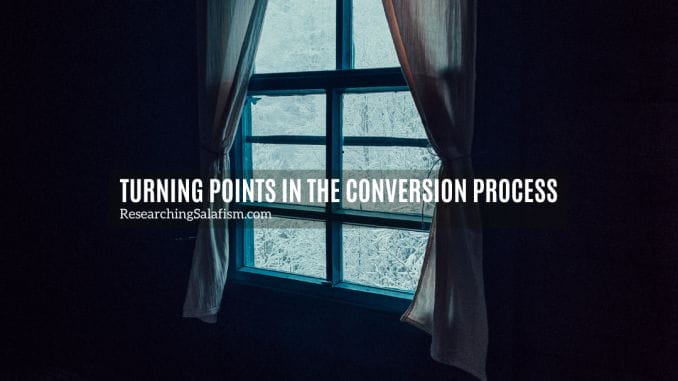
The need for personal change because of the tension present in an individual’s current situation has been cited as the first predisposing condition necessary for religious conversion (Roberts and Yamane 2016:135). The “anomie” or “normlessness” experienced by those in societies undergoing enormous change is often named as one of the main drivers of this tension, since it causes feelings of rootlessness (Roberts and Yamane 2016:135). However, theorists of the process conversion model warn that this tension is “only one source of stress” and should not be viewed as “sufficient by itself to cause a religious conversion” (Roberts and Yamane 2016:135).
For many respondents, various triggers could be cited as predisposing them towards “dissatisfaction with their current situation” (Roberts and Yamane 2016:135). For example, second-generation British Bangladeshi MH respondent Ruqayyah mentioned several such incidents. Among them was the internal conflict she felt when managing the two contrasting worlds of home and work—she felt awkward discussing plans for ‘downtime’ on Friday with colleagues, as for her, this had always been a special day of the week that her parents had taught her was for reciting the Qur’an more plentifully and reminding her of her connection to Allah. This caused Ruqayyah to think more strongly about searching for happiness in something more permanent rather than seeking temporary pleasures like her colleagues at work. However, it was not until she lost her baby shortly after childbirth that she developed greater religious conviction:
It was a wake-up call and straight away I although it happened because of my sins. It felt like a punishment … Allah tests and trials His people.
Fatima also became more contemplative of her life and its direction after the sudden death of her father. This indicates that sometimes, “some types of turning points stimulate the meaning and belonging needs more profoundly than others.” It also demonstrates how religion can fulfil an individual’s psychological needs (termed “primary anxiety” by George Homas), which for Fatima were loss and grief. Despite grieving her father’s death with her much older siblings, Fatima experienced a deep sense of loneliness (her mother had passed away when she was a child) and she tried to resolve this by turning to the religion of her upbringing:
Who do I turn to? What do I do? How do I speak to anyone …? Then I just started to pray the way I was taught in the mosque when I was younger.
This was also the case for Zaynab, who, having given up on religion during her adolescence, had become a successful businesswoman. She had also learnt several languages and travelled widely. Nonetheless, she found it difficult to reconcile her religio-cultural upbringing with her modern lifestyle, and it was not until she made a journey to Makkah that she found the answers to her existential questions. She described her search and the profound emotions she felt upon seeing the ‘Ka’abah’ in the Holy Mosque:
I had everything, but I felt purposeless. Then one day I went to the mountains in Nepal and I saw the sun so beautiful, so perfect … and I although I’d never been to Makkah and Madinah so I went to make Umrah… When I saw the Ka’ba, it changed me … I thought … I’m a woman full of sin … it made me cry.
When Zaynab experienced the huge trauma of being abandoned by her husband for another woman, she reached a crucial “turning point” that she interpreted as a “major test”’ in her life, and that gave her the final push to search for the ‘truth’:
Allah knows best, but maybe it’s because I loved my husband more than I loved Allah that He tested me like that. I broke into a thousand pieces.
Rahima’s search neared its end after she saw the film Malcolm X, which made her feel a strong pull towards Islam’s non-racist call to the worship of one God alone upon Tawheed:
When I went to see Malcolm X, that was it for me. I knew I was coming to Islam. It was a lot to do with Malcolm X and how he gave da‘wa to Tawheed. He didn’t believe white people were devils.
When she had a specific dream shortly after watching the film, it was then that she felt motivated enough to take the final steps towards converting to Islam and Salafism:
I made du’aa, God please give me a kick up the butt, and the next week I had this dream! I dreamed that it was the Day of Judgement. Oh, it was so scary I screamed! When I woke up, I said “I’m going to do it! I’m going to the mosque!”.


Be the first to comment